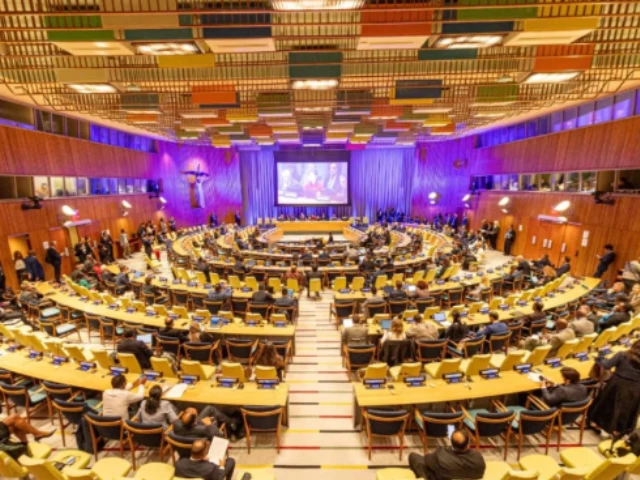Pakistan strongly rebuked India in the United Nations General Assembly, after an Indian diplomat mockingly referred the country as “terroristan”, in a deliberate attempt to defame Pakistan and distract from his own atrocities in Jammu and Cashmira illegally occupied.
The Islamabad representative described the comment as “completely shameful” and described India as a “terrorism series perpetrator.”
The clash was developed during the ongoing general debate when the Indian Rentalia Srinivas diplomat accused Pakistan of promoting terrorism, declaring: “No argument or falsehoods can run out of terrorist crimes.” Previously in the session, the Minister of External Affairs of India, Dr. S. Jaishankar, also described Pakistan, without directly appointing her, as the “epicenter of global terrorism”, citing the murder of tourists in Pahalgam as an example of “cross -border barbarism.”
When exercising his right of response, Muhammad Rashid, second secretary of the UN Mission to the UN, said that India’s attempt to distort the name of a sovereign state was unworthy and presented his frustration. “By participating in this type of rhetoric, India decreases its own credibility, showing the world that it does not have a noun argument to offer, only cheap insignificant unworthy of a serious speech,” he told the assembly of 193 members.
In addition, he said that India was “trying to contaminate the environment of the General Assembly of the United Nations (UNGA) with accusations without foundation.”
Rashid argued that India herself has been involved in sponsoring and supporting terrorism abroad, citing reports from Indian intelligence networks involved in sabotage and specific murders. He referred to the capture of Commander Kulbhushan Jadhav, an Indian naval officer who serves, as proof of the clandestine operations of India in Pakistan.
In addition, he accused New Delhi of “state terrorism” in Jammu and Kashmir of illegal occupation (Iiojk), where he said that extrajudicial murders, arbitrary arrests and staged meetings are routine.
Rejecting Jaishankar’s claims about Pahalgam’s attack, Rashid dismissed the position of “cross -border barbarism” as mere propaganda. He said that Pakistan had condemned the incident in the UN Security Council (UNSC) and even offered an independent investigation, which India rejected. “It is not surprising that until today, no evidence related to that incident has been shared,” he said.
Instead, he accused India of using the episode as a pretext for “shameless aggression” against Pakistan between May 7 and 10, which killed 54 civilians, including 15 children and 13 women. Pakistan responded by virtue of article 51 of the UN Charter, pointing only to military assets and demolishing multiple Indian airplanes, he added.
Read more: Security forces kill 17 terrorists in Lakki Marwat Ibo: ISPR
While Jaishankar urged the global community to drown the financing of terrorism, the sanction of perpetrators and apply the “implacable pressure” about those who adopt terrorism as a policy, Pakistan accused India of riding a covert campaign through representatives such as the Tehrik-E-Taliban Pakistan (TTP), the Liberation Army Bal shows. Majeed Brigade. Rashid said these groups had become places of worship, education and livelihoods in blood spill sites.
Rashid underlining Pakistan’s own sacrifices, Rashid said more than 90,000 lives have been lost in his fight against terrorism, which makes him a recognized pillar in the global efforts against terrorism. “More than 1.9 billion people in southern Asia, a quarter of the world’s population, deserve prosperity and stability. But these objectives cannot be achieved through threats and intimidation,” he said.
“True progress requires sincerity, mutual respect, dialogue and diplomacy: the principles of Pakistan have confirmed, and that India must finally choose to hug, if you really seek peace.” He stressed that Pakistan’s desire for dialogue remains firm, but can only proceed based on dignity and respect, not mockery and slander.
Pakistan -based operation against Fitna al Khwarij
Seventeen terrorists were killed in an intelligence-based operation (IBO) in a volatile southern district of Khyber-Pakhtunkhwa, the army announced on Saturday, a day after Pakistan, China, Iran and Russia expressed “deep concern” about the continuous presence of terrorist groups in Afghanistan.
A mop operation is being carried out in the area, as the ISPR said: “Security forces are determined to eliminate the threat of terrorism sponsored by the country’s Indians.”
Pakistan uses the term “Fitna al Khwarij” for the illegal of Tehreek-E-Taliban Pakistan, an umbrella of terrorist groups responsible for much of terrorist violence in the country. The group has found safe shelters through the border in Afghanistan after its defeat in the Zarb-E-Aazb military operation in the old tribal areas in 2014.
Islamabad has repeatedly urged the Taliban regime in Kabul to fulfill its obligation under the Doha agreement and act against the TTP and other hostile terrorist groups towards Pakistan. However, the Taliban regime maintains a plausible denial, claiming that the problem is found through the border in Pakistan.
Read: Security forces kill 13 terrorists in Dera Ismail Khan Ibo: ISPR
No regional country or international organism is willing to buy the denial of the Taliban because the growing evidence suggests that Afghanistan has once again become a magnet for transnational and international terrorist organizations after the capture of power by the Taliban in August in August 2021.
On Friday, four countries, Pakistan, China, Iran and Russia warned that Afghanistan terrorist attire, such as Isil, Al Qaida, TTP, the Baluchistan Liberation Army (Bla) and others, continue to threaten regional and global security.
The warning was made in a joint statement after its fourth quadrilatric meeting on Afghanistan held outside the 80th session of the UN General Assembly in New York. The meeting, convened by invitation from Russia, brought together foreign ministers from the four states to review the deterioration of the situation in Afghanistan.




